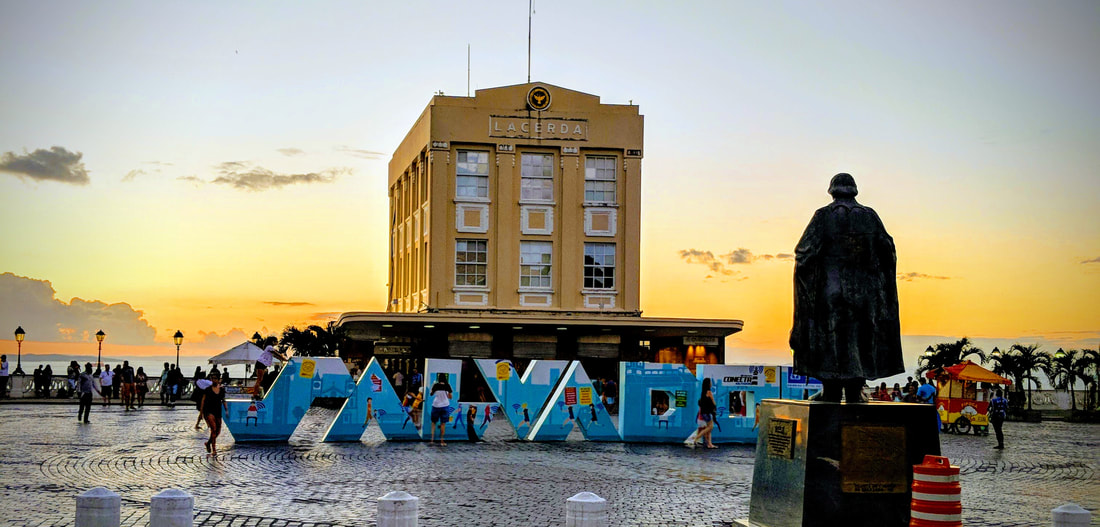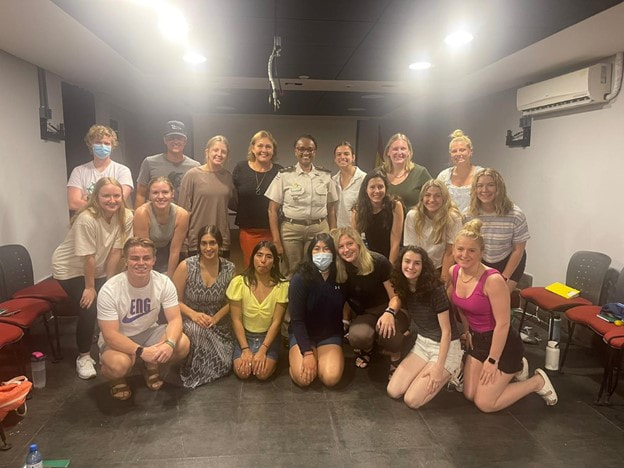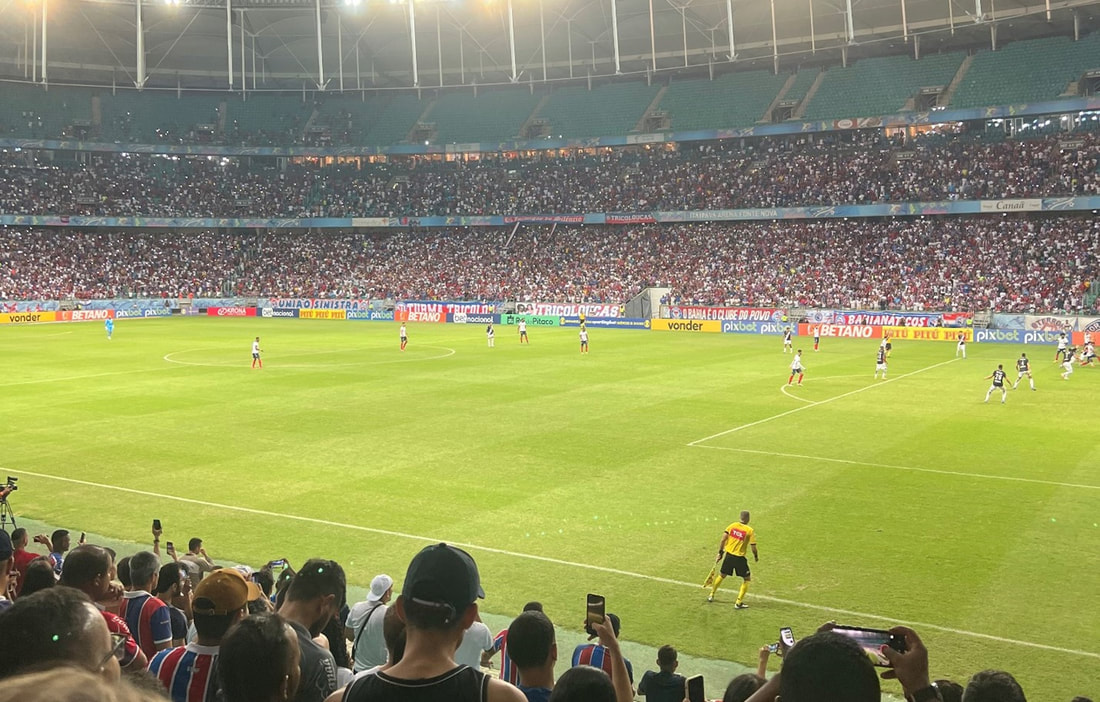|
By Ignacio Sanchez Romero Two recurring themes that I noticed throughout my time in Brazil were tradition and race. These observations broadened my understanding and challenged my assumptions about Brazilian culture and society. Tradition was the first theme that came through in several experiences. We began our trip by attending a lecture with Professor Willys Santos and Alcides about Candomblé, an Afro-Brazilian religious tradition. This was followed by a Capoeira workshop, a martial art that combines dance, gymnastics, and music. We had the opportunity to engage as well as observe, experiencing the tradition's music and history.  The class after our capoeira workshop The class after our capoeira workshop Another example of tradition was attending a Bahia football match, where the fans' chants and songs filled the stadium. These experiences demonstrated how deeply embedded traditions are in Brazilian culture. These are not only things from the past; rather, they are ongoing traditions that influence people's identities. As I gave this some thought, I realized how simple it is to take our traditions for granted. Our cultural identities are built on customs and practices that have been passed down from generation to generation. However, we frequently lose awareness of their importance in the rush of modern life. My time in Brazil made me realize the value of preserving and valuing these traditions. It prompted me to reflect on my own history and the traditions that define me as a Mexican American. I started asking myself deeper questions like, "What does it mean to be a Mexican American?" Who am I and what am I called to do? The second theme, race, became visible through everyday observations. Sitting in a food court one day, I noticed a clear division in the area. While the diners, many of whom were white, were passively enjoying their meals and talking about their plans to visit the beach, people of color made up the majority of those handling the cooking, cleaning, and placing orders. This observation echoed what we discussed in class about race and socioeconomic status. It brought attention to the discrepancies and structural injustices that exist everywhere, not only in Brazil. Lençóis was another place where this pattern was visible, with people of color regularly spotted dealing to make ends meet while white tourists were enjoying their holidays. These were some disturbing and eye-opening observations. They showed me how deeply embedded these inequalities are. It was not limited to the food court or Lençóis; it was present everywhere I looked. This difference served as a reminder to me of how important it is to recognize and address these problems, both in Brazil and at home. While it's simple to overlook such realities when they don't directly impact us, this trip made it difficult for me to stay quiet. Overall, there was more to my trip to Brazil than just a getaway. I had a great opportunity to think about my own identity and learn about a new culture. This experience has increased my understanding of global issues of race and embracing traditions, as well as how they intersect. It has given me a sense of responsibility to spread this awareness and apply it in my daily life. This trip has also taught me the value of being open to new experiences and perspectives. I was able to develop myself and get a broader perspective on the world by getting involved with Brazilian customs and seeing the racial dynamics up close. It served as more proof that traveling is about more than just seeing new places; it's also about having new experiences and growing from them. My wish is that more students will be able to take part in these kinds of trips, not only to travel to new places, but to learn more about different cultures and global issues. We can experience significant personal growth by being willing to try new things and push ourselves beyond our comfort zones.  Ignacio Sanchez Romero is a senior at Saint John's University majoring in Economics with a minor in Data Analytics. He is from Minneapolis, Minnesota. He recently presented a research project on how migration status affects earnings from wages. He discovered that gender and migration status have an impact on wages. During his time in Brazil, he plans to expand on this work by conducting additional research on racial and gender inequality. One interesting fact about him is that this will be his second time leaving the country.
0 Comments
By Hailey Karnowski As my time here in Brazil comes to an end, I thought I would share two of the most memorable experiences that I had that deepened my understanding of Brazilian culture and led me to further question the persistent topics regarding gender. Earlier this week, our group had the pleasure of hearing from Major Denice Santiago who is a police officer in Salvador and has helped create a branch of the police force focused strictly on violence against women. Major Denice informed us about the horrors that women face in households, and how justice was rarely sought due to the fear of not being believed or not having any resources in the first place. I had figured that there was still inequality between men and women—since some of our prior research had suggested that—but was clueless to the fact that violence against women ceases to exist across many aspects of the culture. Before traveling, one of the subtopics we studied was gender’s role in Brazil. One article explained how Brazil still sees a lack of representation of women in power and it was not until 1994 that a woman was elected at the state level (dos Santos and Thomé, 2021). Knowing this, I thought it was amazing that Major Denice started in the police force at the age of 18 and holds a high ranking, but she mentioned to us that there is only so high of a position that women officers can get. Another article expressed how massive the women’s movement in Brazil was to gain the ability to vote only to be faced by backlash, and Major Denice’s talk amplified the idea that this movement has yet to see full equality (Maruci, 2018). Back to Major Denice’s important topic discussed in her lecture—the violence against women in Brazil has plagued numerous households and has not received the social and governmental attention that it needs. Thankfully, Major Denice helped start a program to solely assist in cases and incidents regarding violence against women, but an earlier experience that I had led me to believe that this violence might not just be in the household. Last week, those who wanted to were able to see a live Brazilian soccer match at the stadium in Salvador. For those unfamiliar with Brazilian soccer, soccer or “futebol” is arguably one of the most significant parts of Brazilian culture and helps unite the states and country. As an article we explored suggested, soccer is so popular because anyone can play it no matter the race or socioeconomic background and the sport has become a part of many Brazilians’ identity (Eakin, 2017). It truly brings all sorts of different people together, and as a person who loves sports, it was incredible to see this in person. The game started out like any other major league sport with fans cheering, people buying cups of beer, and guys selling snacks throughout the crowd. However, as the game became tied and the fans became frustrated, I heard numerous sexist slurs being yelled at the players, referees, and even to other fans. I was shocked at some of the things that were being said—of course I know how Americans can get with hockey and football—but it was maddening hearing that the slurs regarded women. It was not until after the game during our lecture with Major Denice that I found out that soccer games are a huge driving force with domestic violence and that the special taskforce actually stays at the stadium to ensure that no women are being harassed or hurt. It was extremely eye opening that a sport so important to a nation holds some toxic behaviors that further the inequalities that women face in society. This experience made me look at Brazil on a more intersectional level, and I realized that although things like soccer are important for unity, there still may be some people that are disadvantaged from it. Although our course explored inequalities persistent in Brazilian culture, I think it is important to note the changes that are currently being made for a more equal and equitable society for women and other marginalized groups. Since the beginning, powerful women activists have made monumental impacts on the culture that is seen today. Take Bertha Lutz and Dilma Rousseff for example. The two women fought against all odds to further women’s rights and gain political power (Noriega, 2020). Since then, women like Major Denice Santiago have been continuing this journey to fight for women’s rights, and their actions have not gone unnoticed. I can only hope that Brazil and the United States continue these efforts toward equality. Works Cited: Eakin, Marshall. “The Beautiful Game: Performing the Freyrean Vision” (2017). In Becoming Brazilians: Race and National Identity in Twentieth-Century Brazil (New Approaches to the Americas, pp. 165-199). Cambridge: Cambridge University Press. doi:10.1017/9781316800058.007 dos Santos, Pedro A. G. and Thomé, Débora, "Women and Political Power in Brazil" (2021). Political Science Faculty Publications. 70. https://digitalcommons.csbsju.edu/polsci_pubs/70 Maruci, Hannah. “Women’s struggle to vote in Brazil: same fight, different strategies” (2018). Oxford Human Rights Hub. https://ohrh.law.ox.ac.uk/womens-struggle-to-vote-in-brazil-same-fight-different-strategies/ Noriega, Christina. “Herstory: 12 Brazilian Women Who Changed the Course of History” (2020). ReMezcla. https://remezcla.com/lists/culture/herstory-brazilian-women-changed-course-history/  Hailey Karnowski is a rising senior at the College of Saint Benedict, pursuing a major in sociology and minor in political science. She is originally from Farmington, Minnesota. Hailey is the new president of the CSB rugby team and works for IT Services. She hopes to work in social work or criminology after graduating and is looking forward to gaining new experiences and perspectives while studying abroad. |
Archives
June 2024
Categories
All
|





 RSS Feed
RSS Feed
